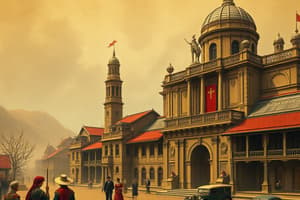Podcast
Questions and Answers
What significant shift marked the Industrial Revolution?
What significant shift marked the Industrial Revolution?
- Transition to mechanized production (correct)
- The emergence of ancient civilizations
- The spread of religions
- The rise of feudalism
Which of the following periods is defined by the rise of the Byzantine Empire?
Which of the following periods is defined by the rise of the Byzantine Empire?
- Medieval History (correct)
- Modern History
- Ancient History
- Early Modern Period
What is the primary difference between primary and secondary sources?
What is the primary difference between primary and secondary sources?
- Primary sources are harder to find than secondary sources
- Primary sources are original documents, while secondary sources interpret those documents (correct)
- Primary sources are outdated, while secondary sources are current
- Primary sources are always written while secondary sources are visual
Which ancient civilization is known for the development of cuneiform writing?
Which ancient civilization is known for the development of cuneiform writing?
What major event occurred during the Early Modern Period?
What major event occurred during the Early Modern Period?
Which theme of history focuses on governance and wars?
Which theme of history focuses on governance and wars?
What led to the spread of Hellenistic culture?
What led to the spread of Hellenistic culture?
Which of the following is not considered a major period in history?
Which of the following is not considered a major period in history?
Flashcards are hidden until you start studying
Study Notes
Key Concepts in History
-
Definition of History: The study of past events, particularly in human affairs. It encompasses the analysis of records, artifacts, and other sources to understand how societies evolve.
-
Chronology: The arrangement of events in the order they occurred. Important for understanding cause and effect in historical narratives.
-
Prehistory: The period before written records. Studied through archaeology and anthropology.
Major Periods in History
-
Ancient History (c. 3000 BCE - 500 CE)
- Emergence of civilizations (e.g., Mesopotamia, Egypt, Indus Valley)
- Development of writing systems (e.g., cuneiform, hieroglyphics)
- Major empires: Roman, Persian, Maurya, Qin.
-
Medieval History (c. 500 - 1500 CE)
- Rise of feudalism and the Byzantine Empire.
- Spread of religions: Christianity, Islam.
- The Crusades and their impact on Europe and the Middle East.
-
Early Modern Period (c. 1500 - 1800)
- Renaissance: Cultural revival in Europe, advancements in art and science.
- Age of Exploration: Discoveries leading to global trade networks.
- The Reformation: Religious schism leading to Protestantism.
-
Modern History (c. 1800 - present)
- Industrial Revolution: Shift to mechanized production.
- World Wars: Major global conflicts altering political and social landscapes.
- Cold War: Tensions between the USA and USSR shaping international relations.
Historical Methodology
- Primary Sources: Original documents or artifacts (e.g., letters, official documents, photographs).
- Secondary Sources: Interpretations or analyses of primary sources (e.g., books, articles).
- Historiography: The study of how history is written and the methodologies historians use.
Historical Themes
- Cultural History: Examines how cultures develop and interact.
- Political History: Focuses on the state, governance, wars, and political movements.
- Economic History: Looks at how economies function and evolve over time.
- Social History: Studies the lived experiences of people, including demographics and social structures.
Important Historical Figures
- Alexander the Great: Conqueror whose empire spread Hellenistic culture.
- Julius Caesar: Roman general and statesman whose actions led to the rise of the Roman Empire.
- Genghis Khan: Founder of the Mongol Empire, known for his military leadership.
- Nelson Mandela: Anti-apartheid revolutionary and the first Black president of South Africa.
Impact of History
- Understanding Change: History illustrates the causes and effects of change over time.
- Cultural Identity: Shapes national identities and collective memory.
- Lessons Learned: Provides insights into human behavior and societal trends, helping to inform present-day decisions.
Key Concepts in History
- History examines past human events using records, artifacts, and sources to understand societal evolution.
- Chronology organizes events in their occurrence sequence, crucial for analyzing historical cause and effect.
- Prehistory refers to the era before written records, primarily analyzed through archaeology and anthropology.
Major Periods in History
-
Ancient History (c. 3000 BCE - 500 CE):
- Civilizations such as Mesopotamia, Egypt, and the Indus Valley emerged.
- Writing systems like cuneiform and hieroglyphics were developed.
- Notable empires included the Roman, Persian, Maurya, and Qin.
-
Medieval History (c. 500 - 1500 CE):
- Feudalism rose in prominence alongside the Byzantine Empire.
- Major religions, including Christianity and Islam, spread significantly.
- The Crusades impacted Europe and the Middle East.
-
Early Modern Period (c. 1500 - 1800):
- The Renaissance signified a cultural revival, advancing art and science in Europe.
- The Age of Exploration created new global trade networks through discoveries.
- The Reformation initiated a religious divide leading to Protestantism.
-
Modern History (c. 1800 - present):
- The Industrial Revolution marked a transition to mechanized production.
- Two World Wars drastically changed political and social structures worldwide.
- The Cold War represented ideological tensions between the USA and USSR influencing international relations.
Historical Methodology
- Primary Sources consist of original artifacts and documents such as letters and photographs, offering firsthand accounts.
- Secondary Sources provide interpretations of primary materials, including books and scholarly articles.
- Historiography involves examining how history is recorded and the methodologies applied by historians.
Historical Themes
- Cultural History explores the development and interactions of cultures.
- Political History centers on governance, wars, and political movements.
- Economic History analyzes the evolution of economies over time.
- Social History focuses on people's lived experiences, demographics, and social structures.
Important Historical Figures
- Alexander the Great expanded his empire, promoting Hellenistic culture across regions.
- Julius Caesar's leadership transformed the Roman Empire, influencing its future.
- Genghis Khan is recognized for founding the Mongol Empire and exceptional military tactics.
- Nelson Mandela, an anti-apartheid activist, became the first Black president of South Africa.
Impact of History
- Understanding historical change elucidates the causes and effects across timeframes.
- History influences cultural identity and shapes national narratives and collective memories.
- Lessons from historical events provide insights into human behavior and societal trends, informing contemporary decision-making.
Studying That Suits You
Use AI to generate personalized quizzes and flashcards to suit your learning preferences.




